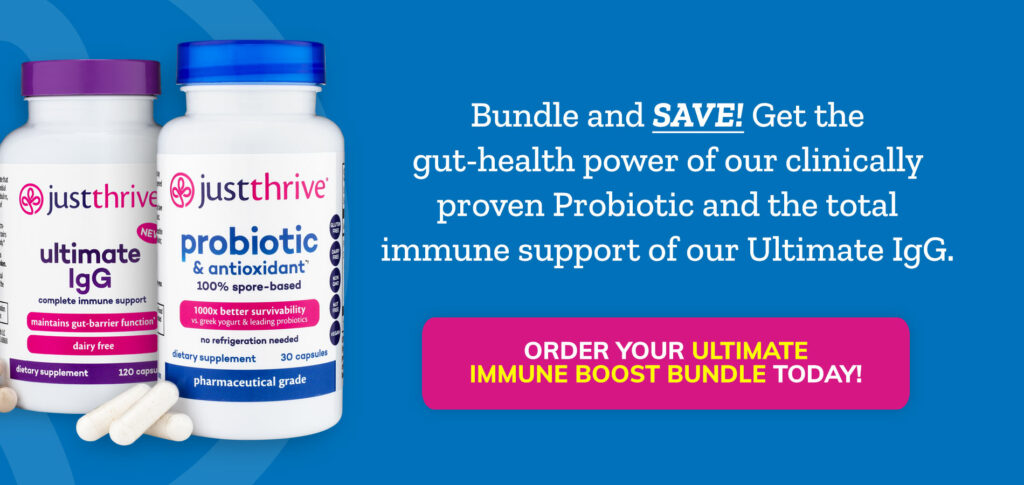Table of Contents[Hide][Show]
Reducing Post-Viral Symptoms+−
- Get Enough Sleep
- Allow Yourself to Rest
- Four Meditations That Will Blow Your Mind
- Stay Hydrated
- Eat Healthy
- Stay Mildly Active
- Take a Spore Probiotic Supplement
- Strengthen Your Immune System
- 10 Tips To Get Through Flu Season with Natural Health and Wellness
- The Best Natural Cold And Flu Remedies For Babies
- How Do You Know If Probiotics Are Working? 7 Tell-Tale Signs
Have you ever recovered from an illness, such as the flu, yet continued to feel completely drained of energy?
You’re physically healthy, you’re not coughing or sneezing, yet you’re completely exhausted.
What gives?
Unfortunately, you may have recovered from the virus, only to fall into post-viral syndrome.
Are you experiencing post-viral syndrome? What are the symptoms, and are they avoidable?
Let’s take a closer look at what might be causing your exhaustion—and other symptoms—and what you can do to feel better.
What Is Post-Viral Syndrome?
As you can infer from the name, post-viral syndrome occurs after you’ve had a viral infection, like the flu.
After your body has recovered from the virus, you may experience symptoms such as a lingering weakness, tiredness, or fatigue for days, weeks, or—in more extreme cases—even months.
Post-viral syndrome can often be confused with myalgic encephalomyelitis/chronic fatigue syndrome (ME/CFS), two other syndromes with similar symptoms. In fact, doctors often treat post-viral syndrome the same way they treat ME/CFS.
However, post-viral syndrome appears to develop as a reaction to the initial virus, while ME/CFS doesn’t have such an obvious trigger or starting point.
In other words, ME/CFS includes extreme tiredness for no clear reason, while post-viral syndrome is clearly the result of a virus.
But which viruses can result in post-viral syndrome? Let’s look at the most common ones.
Viruses That Can Lead to Post-Viral Syndrome
Almost any viral infection or illness can result in post-viral syndrome, including some quite common ones.
- Cold
- Flu
- West Nile virus
- Pneumonia
- Epstein-Barr virus
- Herpes
- Human immunodeficiency virus (HIV)
- COVID-19, which can leave lasting symptoms that are commonly referred to as long COVID
Of course, not every person who experiences one of these infections will develop post-viral syndrome. Or, you may experience it with one virus but not another.
So what should you look out for? What are the tell-tale signs that you may have post-viral syndrome?
Symptoms of Post-Viral Syndrome
Post-viral syndrome can look different from person to person. You may not have the same symptoms as someone else, or you may have similar symptoms but with different intensities.
For the most part, post-viral syndrome will leave you feeling fatigued, drained of any energy, and generally feeling unwell. You may or may not have these additional symptoms.
- Confusion
- Difficulty concentrating
- Headaches
- Muscular pain or aching
- Sore throat
- Stiff joints
- Swollen lymph nodes
If your symptoms persist for longer than a few weeks, or seem to be getting worse, you should see your doctor or healthcare provider.
Related
Are You Suffering From Brain Fog? Here Are 21 Surefire Ways To Keep Your Mind Sharp
As we age, our bodies deteriorate and our brains are no exception. Keep your brain in tiptop shape and keep brain fog at bay with these tips.
The Link Between Post-Viral Syndrome and Gut Health
The symptoms of post-viral syndrome are triggered by a viral infection, such as the ones we listed above.
But not everyone experiences these symptoms, so there’s clearly something deeper than just the infection.
What truly lies behind these symptoms? What can cause one person to experience it, but not another?
The answer lies in your gut health.
Dysbiosis
Your gut is already home to trillions of bacteria: beneficial (“good”) bacteria and pathogenic (“bad”) bacteria.
Due to the limited space in your gut microbiome, they live in a tentative balance. When one type of bacteria flourishes, the other flounders. The key to good gut health is to make sure that the beneficial bacterial colonies are the ones that thrive.
Unfortunately, the opposite is much more common, resulting in a condition known as dysbiosis.
When your body is experiencing dysbiosis, it can have a negative impact on your digestive, immune, and overall health.
And it can exacerbate conditions such as ME/CFS and post-viral syndrome. Recent research has discovered a link between post-viral syndrome and bacteria—more specifically, your gut bacteria.
These same studies show a marked difference in the diversity, bacterial species, and overall microbiomes of people who suffer from ME/CFS versus those who don’t.
Some of their findings include:
- A much lower level of several beneficial bacterial species, including those that produce butyrate. This is a short-chain fatty acid that, among other duties, supports your immune system.
- Increased levels of pathogenic bacteria, including those associated with inflammation and autoimmune diseases.
Inflammation
Dysbiosis can also cause intestinal permeability, or “leaky gut.”
Your intestinal lining is a semi-permeable barrier, like a net with tiny holes, allowing water and nutrients to pass through and into your bloodstream. But that barrier can become compromised, allowing larger, toxic substances to pass through.
When that happens, your immune system is activated, as it tries to protect your body from the potential damage caused by toxins.
This heightened immune response can lead to chronic inflammation.
How is this related to post-viral syndrome?
Researchers are finding that persistent inflammation, especially neuroinflammation (inflammation of the brain), could be contributing to fatigue and other symptoms commonly associated with post-viral syndrome.
In this case, it’s not that your immune system isn’t responding, it’s that your immune system is over-responding and remaining in that hyper-responsive state.
Reducing Post-Viral Symptoms
If your post-viral syndrome is unmanageable, interfering with your career, personal relationships, or quality of life, your healthcare provider may be able to help. A proper diagnosis and medical treatment may alleviate some of your symptoms or reduce their duration.
For most people, though, it’s a waiting game. Eventually, your case of post-viral will taper off and come to an end.
In the meantime, there are some things you can do to help manage your symptoms.
Get Enough Sleep
To ensure you get enough quality sleep, turn your bedroom into a sleep sanctuary. Use blackout curtains, keep your bedroom cool, and avoid caffeine later in the day.
Also, you should avoid using electronics close to bedtime. The blue light they emit can interfere with your body’s production of melatonin, disrupting your sleep cycle.
Most adults need around 7 to 9 hours to feel truly rested. But, if you’re feeling extra tired or fatigued due to post-viral syndrome, you may need a bit more sleep.
You may also want to nap during the day. Try to keep your naps short and not too late in the day, so they don’t interrupt your nighttime sleep.
Allow Yourself to Rest
If you’re used to being on the go, it might feel odd to just… rest.
But rest is one of the best things you can do for your body when you’re suffering the effects of post-viral syndrome.
Conserve energy as much as possible, reducing your daily activities to stay well-rested.
This includes resting your mind. Cognitive activities such as reading, watching television, etc. also use up energy, so be mindful of where you’re placing your attention.
For those activities that you absolutely must do, pace yourself. Split up chores and errands so that you’re not overdoing it all in one day.
If you’re having trouble relaxing, meditation and breathwork can help calm your mind and your body. You can also listen to music, sit in nature, or do other low-energy activities.
Related
Four Meditations That Will Blow Your Mind
If you struggle with meditation or find it boring or uncomfortable, then try these four meditations. Each builds on the last to make the experience more enjoyable.
Stay Hydrated
Water can help relieve some of the symptoms you might experience with post-viral syndrome, especially headaches and fatigue.
Research shows that when your body is low on fluids, it has to work harder to maintain its water balance, which can leave you feeling tired. Added to post-viral syndrome, you could end feeling drained.
And, water carries nutrients through your body, nourishing your cells and giving you more energy, which is just what you need while recovering from post-viral syndrome.
Eat Healthy
Eat healthy, nutritious foods that fuel your mind and body while you’re recovering.
- If you don’t have much of an appetite, eat smaller, more frequent meals throughout the day.
- If you’re too tired to prepare meals, choose easy-to-prepare foods that are still nutritious or consider using a meal service.
- When you have extra energy, cook meals that can be divided into smaller portions and frozen.
- Smoothies are an excellent alternative when you need nutrition but don’t have the energy to prepare a meal.
Also, avoid foods with excessive sugar or caffeine. Although you may be tempted by the quick energy boost, the inevitable crash that follows will make your fatigue worse.
Stay Mildly Active
The key here is the word “mildly.”
This isn’t the time to head to the gym or even take a long walk. Instead, focus on gentle movements and stretching. This can help reduce some of the muscle aches associated with post-viral syndrome.
Take a Spore Probiotic Supplement
We’ve already discussed the undeniable link between gut health and post-viral syndrome, as well as the importance of having a healthy gut microbiome.
Spore probiotics are “Bacillus” strains of bacteria, which are capable of surviving in harsh environments, thanks to their natural endospore shell that protects them from hazards like stomach acid and digestive enzymes. This is what makes them vastly more effective than Lactobacillus or Bifidobacterium strains found in probiotic foods and most supplements.
When you take a spore probiotic, it joins forces with the colonies of “good” bacteria, adding both quantity and quality, and crowding out the “bad” bacteria. As the beneficial bacterial colonies grow and the pathogenic bacterial colonies diminish, your gut microbiome is able to reach an optimal balance.
Studies show that probiotics can help with post-viral syndrome, improving fatigue, mood, and overall quality of life.
Our favorite spore probiotic supplement is Just Thrive Probiotic.
It’s guaranteed to arrive 100% alive in your gut and has 1000x better survivability vs. leading probiotics.
Once in your gut, its four clinically researched superstrains work together to promote digestive, immune, and overall health. They can also improve sleep, support nutrient absorption, and promote energy—all crucial while you’re battling the symptoms of post-viral syndrome.
Strengthen Your Immune System
Some doctors and researchers think that post-viral syndrome may be caused if your body is taking too long to clear out the final traces of a virus. So you want to make sure that your immune system is healthy, to get rid of the virus effectively and avoid future viruses.
But, if your immune system is overactive, it can cause inflammation and stress, which can worsen symptoms of post-viral syndrome.
The key is to find the middle: a strong, balanced immune response that is neither overactive or underactive.
And you can do that with Just Thrive Ultimate IgG, an immune-supporting supplement.
IgG antibodies are your body’s first line of defense against infectious substances, including pathogenic bacteria in your gut and viruses—both of which are associated with post-viral syndrome.
Because these antibodies are always on patrol to fight infections, your body may need some additional help when your immune system becomes overwhelmed.
Ultimate IgG is packed with powerful antibodies that drive an effective, balanced immune response—no overreacting and no underreacting.
Together, Ultimate IgG and Just Thrive Probiotic create a powerhouse duo.
- The spores in the probiotic get to work balancing your microbiome as soon as they reach your gut, and pathogens begin to die.
- Ultimate IgG cleans up the debris by binding to the dead microbes and the toxins they produce.
- This allows the spores to claim more territory in your gut and clear out stubborn pathogens.
- Removing these substances promotes a healthy inflammatory response, strong gut lining, and overall immune health.
And, because your body encounters toxins and pathogens every day, Ultimate IgG and Just Thrive Probiotic are perfectly safe to use together, long-term. Get the bundle here and save.
Final Thoughts
Fighting off a viral infection is only the first step in regaining your health and energy. Recovering can be delayed by post-viral syndrome, which can leave you feeling exhausted, foggy, and drained—physically and mentally.
But, although there isn’t an easy solution, you can manage your symptoms and even speed up your recovery.
With a few tweaks to your lifestyle, and enough time, you’ll soon be on your way to feeling like your healthy self once more!
You May Also Like…






